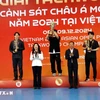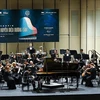Do Thi Phuong Mai placed second in a classical singing competition in Moscow, Russia, at the end of November. She spoke to Viet Nam News about her achievement as well as the many challenges of continuing a long-distance relationship.
* Can you tell me more about the scale and special features of the competition in which you have just become the runner-up?
It is a prestigious grand competition named after the world-renowned Russian singer Rachmanninov and is held every three years to discover new classical singing talents. The competition drew participation from many students and postgraduates of famous Russian music institutes such as Tchaikovski and Gneshin as well as from other European musical institutes and also attracted singers representing Chinese and Russian theatres. I'm one of the two representatives of the Gneshin Music Institute.
* What does winning the prize mean to you?
The prize includes two merit certificates for both the contestant and the supervising professor. The cash award is neither too much nor too little but is sufficient to cover the entry fee, host a small party for my lecturers and friends, and afford the airplane fare back to Vietnam to enjoy the Tet (Lunar New Year) holiday with my husband.
The prize means a lot to me because it acknowledges my efforts in studying classical music. It is also a gift that recognises my dedication and the favourable circumstances created by my family, the Military University of Culture and Arts, the Ministry of Defence, and the State, affording me the opportunity to study abroad.
* How did you feel before entering the competition?
When my professor, who is also the head of the department of vocal music at Gneshin National Music Institute, enrolled me in the competition, I felt both happy and nervous, wondering whether I was competent enough for such a grand contest.
* What did you do to overcome your nervousness?
While preparing for the contest, I consulted my family and Kim Phuc, my teacher in Vietnam, and received huge support from them. I also contacted lecturer Duc Trinh to ask for his permission to use his song "Mien xa tham" (Far-away land), because the contestants had to perform one national song besides performing three classical works.
When I practiced under the instruction of my lecturer, I was scolded a lot. At times, she wanted to withdraw me from the contest, which made me feel very sad but also more determined, and later, fortunately, everything became smoother.
* What is your plan for studying and working in the future?
I'm going to further my studies and try to complete my doctorate at the Gneshin Music Institute in another year, and then I will return to Vietnam to continue teaching and performing and will have a baby.
* What is your impression of Russia and the Gneshin Music Institute?
I have been living in Russia for over two years. My impression is that Russia is very beautiful, romantic and ancient. At first, I felt pretty bewildered because my Russian was not very good, and I'm the only Vietnamese student in the school. But now, everything is OK.
The study environment at the Gneshin Music Institute is very positive. There are many excellent students there who have continually won international prizes. I think I have to try harder to catch up with their method of education at the institute because I need to improve and perfect my skills.
* What do you remember most about Vietnam?
It would have to be coffee. Russia also has coffee, but it is not as flavourful.
* After winning the first prize at the national concert-opera singing contest in 2009, you worked as a lecturer at the Hanoi -based Military University of Culture and Arts, and then, you were assigned to study abroad in Russia. Therefore, you have been living apart from your husband for over two years. You two had to part ways soon after your marriage. How do you overcome these difficulties?
We had loved each other for eight years before we got married; then, I was assigned to study abroad six months later. To be honest, I did not think I would be assigned so soon, so I felt quite bewildered. However, my family and especially my husband have strongly encouraged me to study and absorb new knowledge to pass down to the next generation of singers. We both encouraged each other to overcome our difficulties. My husband still keeps lecturing at the university and performing for shows. Sometimes, I'm invited back to perform in Vietnam, which is an opportunity for us to reunite. However, we still chat online with each other every day. The era of technology has greatly narrowed our separation.
* Do you prefer fame or talent?
In my opinion, all artists long for fame. But what's more important is that they have to be truly dedicated to the art. An artist has to love and be passionate about his career and must have both responsibility and talent.-VNA
* Can you tell me more about the scale and special features of the competition in which you have just become the runner-up?
It is a prestigious grand competition named after the world-renowned Russian singer Rachmanninov and is held every three years to discover new classical singing talents. The competition drew participation from many students and postgraduates of famous Russian music institutes such as Tchaikovski and Gneshin as well as from other European musical institutes and also attracted singers representing Chinese and Russian theatres. I'm one of the two representatives of the Gneshin Music Institute.
* What does winning the prize mean to you?
The prize includes two merit certificates for both the contestant and the supervising professor. The cash award is neither too much nor too little but is sufficient to cover the entry fee, host a small party for my lecturers and friends, and afford the airplane fare back to Vietnam to enjoy the Tet (Lunar New Year) holiday with my husband.
The prize means a lot to me because it acknowledges my efforts in studying classical music. It is also a gift that recognises my dedication and the favourable circumstances created by my family, the Military University of Culture and Arts, the Ministry of Defence, and the State, affording me the opportunity to study abroad.
* How did you feel before entering the competition?
When my professor, who is also the head of the department of vocal music at Gneshin National Music Institute, enrolled me in the competition, I felt both happy and nervous, wondering whether I was competent enough for such a grand contest.
* What did you do to overcome your nervousness?
While preparing for the contest, I consulted my family and Kim Phuc, my teacher in Vietnam, and received huge support from them. I also contacted lecturer Duc Trinh to ask for his permission to use his song "Mien xa tham" (Far-away land), because the contestants had to perform one national song besides performing three classical works.
When I practiced under the instruction of my lecturer, I was scolded a lot. At times, she wanted to withdraw me from the contest, which made me feel very sad but also more determined, and later, fortunately, everything became smoother.
* What is your plan for studying and working in the future?
I'm going to further my studies and try to complete my doctorate at the Gneshin Music Institute in another year, and then I will return to Vietnam to continue teaching and performing and will have a baby.
* What is your impression of Russia and the Gneshin Music Institute?
I have been living in Russia for over two years. My impression is that Russia is very beautiful, romantic and ancient. At first, I felt pretty bewildered because my Russian was not very good, and I'm the only Vietnamese student in the school. But now, everything is OK.
The study environment at the Gneshin Music Institute is very positive. There are many excellent students there who have continually won international prizes. I think I have to try harder to catch up with their method of education at the institute because I need to improve and perfect my skills.
* What do you remember most about Vietnam?
It would have to be coffee. Russia also has coffee, but it is not as flavourful.
* After winning the first prize at the national concert-opera singing contest in 2009, you worked as a lecturer at the Hanoi -based Military University of Culture and Arts, and then, you were assigned to study abroad in Russia. Therefore, you have been living apart from your husband for over two years. You two had to part ways soon after your marriage. How do you overcome these difficulties?
We had loved each other for eight years before we got married; then, I was assigned to study abroad six months later. To be honest, I did not think I would be assigned so soon, so I felt quite bewildered. However, my family and especially my husband have strongly encouraged me to study and absorb new knowledge to pass down to the next generation of singers. We both encouraged each other to overcome our difficulties. My husband still keeps lecturing at the university and performing for shows. Sometimes, I'm invited back to perform in Vietnam, which is an opportunity for us to reunite. However, we still chat online with each other every day. The era of technology has greatly narrowed our separation.
* Do you prefer fame or talent?
In my opinion, all artists long for fame. But what's more important is that they have to be truly dedicated to the art. An artist has to love and be passionate about his career and must have both responsibility and talent.-VNA



















